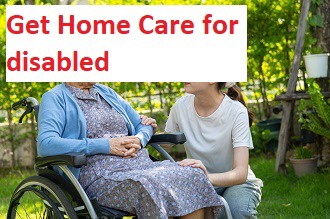Home Care programs for disabled.
Adults under the age of 60 can often enroll into Home Care assistance programs. State government will often pay for the costs involved in offering this service as part of Medicaid. The care arranged can help a disabled person with all types of activities that will allow them to continue to live in their current home rather than have to move into a long term care facility or nursing home. Find details on Home Care for disabled people and how to apply.
While the terms and conditions will vary by state, in general the client will need to pay a portion of the cost for this service. But some state governments and local municipalities may offer this for free to income qualified applicants. If there is a cost, the client can often use either private or government insurance, such as a Medicaid Waiver or SSI, to pay a portion of the bill. So this can often make Home Care very affordable. In some instances a state may provide all of the care for free, if the applicant meets certain eligibility conditions including based on income.
Services provided by Home Care Assistance Programs
Terms vary by state. In general, Home Care will provide free basic homemaking services for clients. The programs are usually only offered for adults with disabilities who meet certain income thresholds as well. A local department of Human Services, or the equivalent government office, in a county can provide more details on what is covered by the program as well as application process.
However, Home Care will generally ensure the disabled person has access to house cleaning, meal preparation, bathing, laundry, and minor home repairs. Whatever it takes to allow the adult with disabilities to continue to live on their own and avoid moving into a nursing home or facility is available. The case managers that partners with the client or their caregiver will also help them develop personal care plans, arrange for services, and provide ongoing advice. There is even support for the caregiver, and learn more on government assistance for caregivers of elderly parents.
Home Care is only for the disabled. It needs to be documented by a physician. The condition also needs to prevent the person from doing activities that they need to remain living independently. So they need to have help for shopping for food or preparing a meal. Other activities may be for picking up medications or doing housework, such as laundry, dusting, or kitchen cleaning. In general, the applicant will need a homemaker in effect stop them from being institutionalized.
Only basic needs and tasks are covered. If a client needs other types of assistance, such as medication monitoring, heavy chore tasks, or personal care, then a case manager will offer referrals to other resources. But as noted, in general free housecleaning, cooking and other services are offered.
Once enrolled, a case manager will meet with the adult. They will determine what the need is, and what can be provided to them. Based on those results, they will then make arrangements for the home care with a free government paid for caregiver. It will generally only be a few to several hours per week, so it is very limited in scope.
The programs are generally flexible. Clients can often hire their own home care assistant and be reimbursed by the government. This individual will need to be screened and approved by the case manager. Or they can use a pre-screened agency homemaker.
Application process for free home services for the disabled
The eligibility conditions will vary by county as well as state government. As noted, contact a social service department for more information. Home Care Assistance will be for adults only that are under the age of 60. They will also need to have a limited income. Also, the home can't have any other adults living in it who do those tasks.
Depending on what state the client lives in, Home Care Assistance will usually require the disabled person to pay a small fee. If the applicant's income is low enough, the service may be free. If there is a cost do, some programs such as Medicaid Waiver may pay for it.
One way to tell if someone is qualified for a Home Care Assistance Program is if they get some type of entitlement. Benefits that usually qualify someone includes Transitional Aid to Families with Dependent Children, Medicaid or Supplemental Security Income. Medicaid will often pay for the service too. Locate other free services through Medicaid.
Other one in most states will be Emergency Aid to the Elderly, Disabled, and Children (EAEDC). Or people on SSI will often get free home services, including yard work, cleaning, and in home care. In these cases, the person is usually automatically financially eligible for assistance.
If someone is over that age cut off or does not qualify based on income, then they can explore other programs that are targeted more for senior citizens, and an Agency on Aging office is often the best place for information. As in addition to Home Care, there are many other programs for seniors that can enable someone to continue to living at home with their families for as long as possible.
For more information on applying, or alternatives, it is recommended to call a local government agency such as human or social service office. For more details on where to apply, locate home care and public aid.
Related Content From Needhelppayingbills.com
|